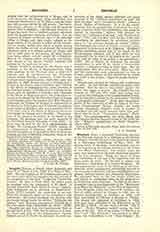

Brugiere, PIERRE, a French priest, Jansenist, and Juror, b. at Thiers, October 3, 1730; d. at Paris, November 7, 1803. He was chaplain of the Ursulines and canon in his native place when his refusal to sign the formula of the acceptation of the Bull “Unigenitus” forced him to leave. He went to Paris where for twelve years he remained with the community of St. Roch. A strongly Jansenistic book which he wrote, “Instructions catholiques sur la devotion au Sacre-Coeur” (Paris, 1777), brought this connection to an end. When the Revolution broke out he welcomed it with enthusiasm. He rushed headlong into the fray with two books calling loudly for reform: “Doleances des eglisiers” and “Relation sommaire et veritable de ce qui s’est passe dans l’Assemblee du clergy” (1789).
Brugiere not only took the Constitutional Oath on the day fixed, January 9, 1791, but he became as it were, the heart and soul of the Constitutional Church. Elected cure of St. Paul’s he defended the civil constitution of the clergy against episcopal and papal censures in his “Discours patriotique au sujet des brefs du pape” and “La lanterne sourde” (aimed at Bonal, Bishop of Clermont). It is to his credit, however, that he energetically condemned the marriage of priests which the Constitution was doing its utmost to encourage. Against this practice he wrote his “Reflexions d’un cure”, and “Lettre d’un cure” (1791), and together with several other constitutionals he denounced its advocates without mercy in “Le nouveau disciple de Luther” (1792). This brochure was aimed at Aubert, a married priest appointed by Gobel cure of St. Augustin. Brugiere’s fearless preaching placed him in the hands of the Revolutionary tribunal, and it was while he was imprisoned that he wrote to his followers the “Lettre d’un cure du fond de sa prison a ses paroissiens” (1793). Set at liberty, he continued his pastoral ministrations in spite of the charge of treasonable conduct, a dangerous thing in those days. But his ministrations were of a novel kind. Mass was said and the sacraments were administered by him in French, and in support of that singularity an appeal was made to the people, “Appel au peuple franpais” (1798).
Brugiere had rebuked the bishops who condemned the oath. He had likewise rebuked the priests who married. Now he was no less violent against the Jurors who began to retract. He attended the two councils of 1797 and 1801 which were trying hard to sustain the ebbing life of the Constitutional Church, and he founded a society for its protection: “Societe de philosophie chretienne”. Even after the promulgation of the Concordat of 1801 he clung to the then dead Constitutional Church. Besides the works already mentioned, Brugiere wrote a number of pamphlets and left many sermons which were published after his death: “Instructions choisies” (Paris, 1804). Two contemporaries, the Abbe Massy and the Christian Brother Renaud, wrote his life under the title: “Memoire apologetique de Pierre Brugiere” (Paris, 1804).
J. F. SOLLIER

